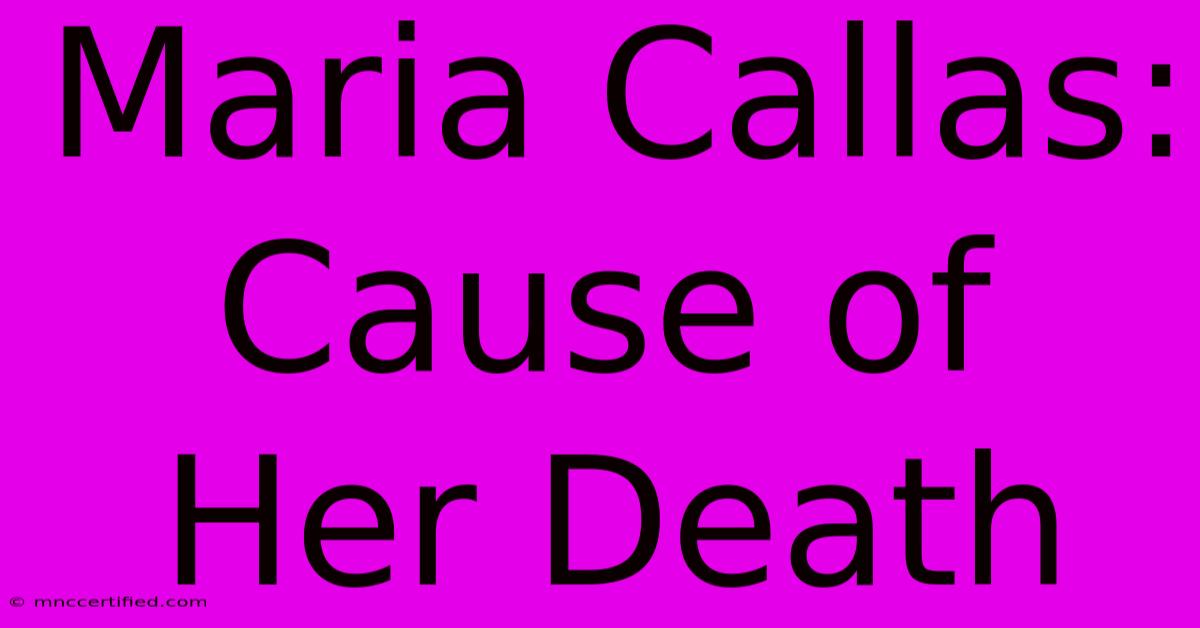Maria Callas: Cause Of Her Death

Table of Contents
Maria Callas: Unraveling the Mystery of Her Death
Maria Callas, a name synonymous with operatic brilliance and dramatic intensity, remains a captivating figure even decades after her death. While her unparalleled vocal talent and tempestuous life are well-documented, the exact cause of her death at the young age of 53 continues to spark speculation and debate. This article delves into the complexities surrounding her passing, exploring the official cause and the contributing factors that may have played a role.
The Official Cause: Heart Failure
The official cause of death, as recorded on her death certificate, was cardiac arrest. This, however, doesn't provide a complete picture. Cardiac arrest is often a symptom rather than a root cause, indicating a failure of the heart's electrical system, often triggered by an underlying condition. Therefore, understanding the contributing factors is crucial to comprehending the full story behind Maria Callas' untimely demise.
Contributing Factors: A Complex Web of Possibilities
Several factors are believed to have contributed to Callas' cardiac arrest, intertwining to create a perfect storm:
-
Barbiturate Overdose (Possible): While not definitively proven, there has been persistent speculation about a possible barbiturate overdose. Callas suffered from insomnia and anxiety, conditions sometimes treated with barbiturates. An overdose could have weakened her heart and triggered the fatal cardiac arrest. This remains a controversial aspect, as toxicology reports from the time were not conclusive.
-
Underlying Heart Conditions: It's plausible that Callas suffered from an undiagnosed or undertreated heart condition. Stress, both physical and emotional, can significantly exacerbate existing heart problems. Her demanding career, tumultuous personal life, and struggles with weight fluctuations likely put considerable strain on her cardiovascular system.
-
Years of Stress and Emotional Trauma: Callas' life was far from serene. Her intense professional dedication, coupled with highly publicized and emotionally charged relationships, undoubtedly contributed to significant stress. Chronic stress is a well-known risk factor for cardiovascular disease.
-
Weight Fluctuations and Dieting: Callas' dramatic weight loss throughout her career placed considerable strain on her body. Extreme dieting, often associated with eating disorders, can negatively impact heart health and contribute to various health complications.
-
Medication Side Effects: The myriad medications Callas may have been taking for various ailments could have also interacted negatively, potentially contributing to her cardiac arrest.
The Enduring Mystery and Ongoing Speculation
The lack of definitive answers surrounding the exact cause of Maria Callas' death fuels ongoing speculation. Was it solely a heart attack, or were other factors, such as medication interactions or potential substance abuse, significant contributors? The lack of comprehensive toxicology reports from that era makes it difficult to reach a conclusive answer.
Beyond the Medical: The Legacy of Maria Callas
Regardless of the precise cause, Maria Callas' death remains a tragedy that robbed the world of a truly extraordinary artist. Her legacy, however, transcends the circumstances of her passing. Her breathtaking vocal abilities, passionate interpretations, and enduring influence on the operatic world continue to inspire and captivate audiences worldwide. Her life, even with its complexities and uncertainties, remains a powerful testament to the power of talent, passion, and the enduring human spirit.
Keywords: Maria Callas, cause of death, death, cardiac arrest, heart failure, barbiturates, overdose, stress, weight loss, dieting, health complications, opera singer, legacy, Maria Callas death mystery, Maria Callas health
Note: This article aims to provide information based on available sources. The cause of death remains a topic of some debate, and this article presents various contributing factors without definitively concluding the primary cause.

Thank you for visiting our website wich cover about Maria Callas: Cause Of Her Death. We hope the information provided has been useful to you. Feel free to contact us if you have any questions or need further assistance. See you next time and dont miss to bookmark.
Featured Posts
-
Pep Updates On Kovacic Foden Before Juventus
Dec 12, 2024
-
Wham S Last Christmas A Holiday Classic
Dec 12, 2024
-
Trio Return Juventus Clash Preview
Dec 12, 2024
-
Historic Bidwell Mansion Burns In Chico
Dec 12, 2024
-
Uefa Youth League Juve Man City Draw
Dec 12, 2024